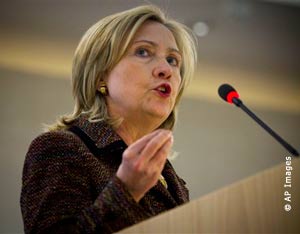Clinton Urges Negotiators to Adopt Nuclear Materials Treaty
Clinton Urges Negotiators to Adopt Nuclear Materials Treaty

Secretary of State Hillary Rodham Clinton calls for a new treaty to ban production of weapons-grade uranium and plutonium.
Secretary of State Hillary Rodham Clinton called for the Conference on Disarmament to move ahead quickly on a proposed treaty that would ban the production of nuclear-weapons-usable fissile materials.
“Halting production is in the interest of every country, and I urge this conference to end the stalemate and open negotiations on a Fissile Material Cutoff Treaty without further delay,” Clinton said in a speech before the 65-nation, Geneva-based conference February 28.
“The United States is deeply committed to reducing nuclear weapons and the risk of nuclear proliferation. Our long-term goal, our vision, is a world without nuclear weapons,” Clinton said.
President Obama announced during a speech in Prague April 5, 2009, that he would work to rid the world of nuclear weapons. Since then the United States has redefined its use of nuclear weapons in its national defense; convened a 47-nation Nuclear Security Summit in Washington and agreed to lock down vulnerable nuclear materials over a four-year period; ratified the U.S.-Russia arms cut treaty (New START) to reduce nuclear arsenals to their lowest levels since the 1950s; and joined with other member nations in the Nuclear Non-proliferation Treaty to strengthen one of the world’s oldest nonproliferation initiatives.
“We should continue to advance nuclear security by turning now to the negotiation of a verifiable ban on fissile-material production for bombs,” Clinton said.
The fissile material treaty was first proposed in 1993 by then-President Bill Clinton in an address to the U.N. General Assembly. According to the Federation of American Scientists, the treaty “would strengthen nuclear nonproliferation norms by adding a binding international commitment to existing constraints on nuclear-weapons-usable fissile material.”
Fissile materials used in nuclear bomb production include highly enriched uranium and plutonium. The proposed treaty, which has been under discussion at the Conference on Disarmament, would prohibit further production of these materials for nuclear weapons and other explosive devices.
A concern of the United States and most other nations is that nuclear bomb-making materials could fall into the hands of terrorist groups or extremists, threatening regional and global security.
“If we are serious about reducing the possibility that fissile material could fall into terrorists’ hands, then we must reduce the amount of such material that is available,” Clinton told the delegates. “For that reason, the United States also supports reducing stocks of separated plutonium and highly enriched uranium and minimizing the future use of highly enriched uranium for civilian purposes.”
Clinton said the United States and Russia have made significant progress toward those goals, and will continue to make them a focus of U.S. nuclear diplomacy.
U.N. Secretary-General Ban Ki-moon encouraged the conference on February 24 to “move ahead vigorously” on the fissile material treaty or risk slipping into irrelevance. Work has been stalled at the conference on the treaty because of objections by one or more nations over terms contained in the treaty.
The 65-member Conference on Disarmament was established in 1979 to focus on the cessation of the nuclear arms race and promote nuclear weapons disarmament, prevention of nuclear war, and the prevention of a nuclear arms race in space.